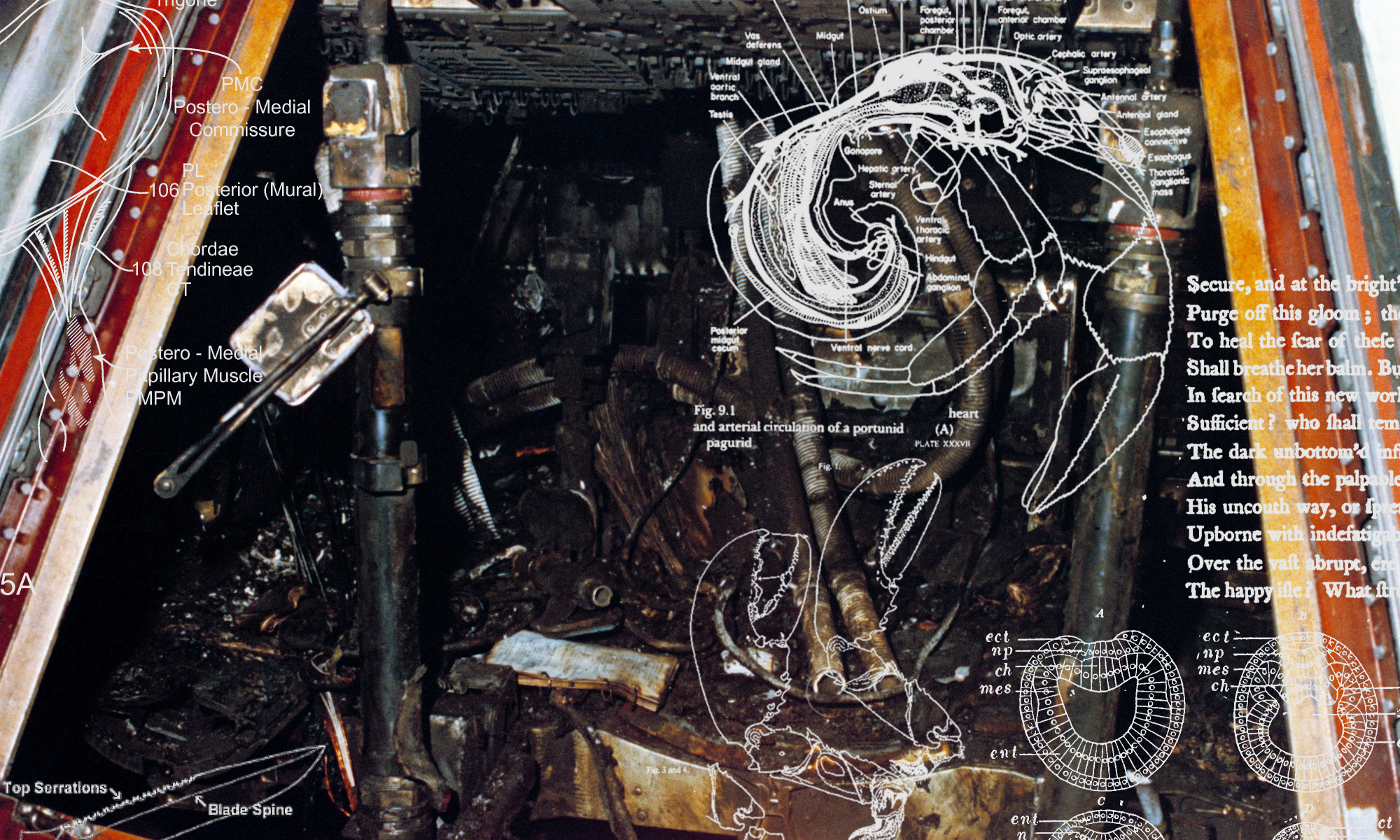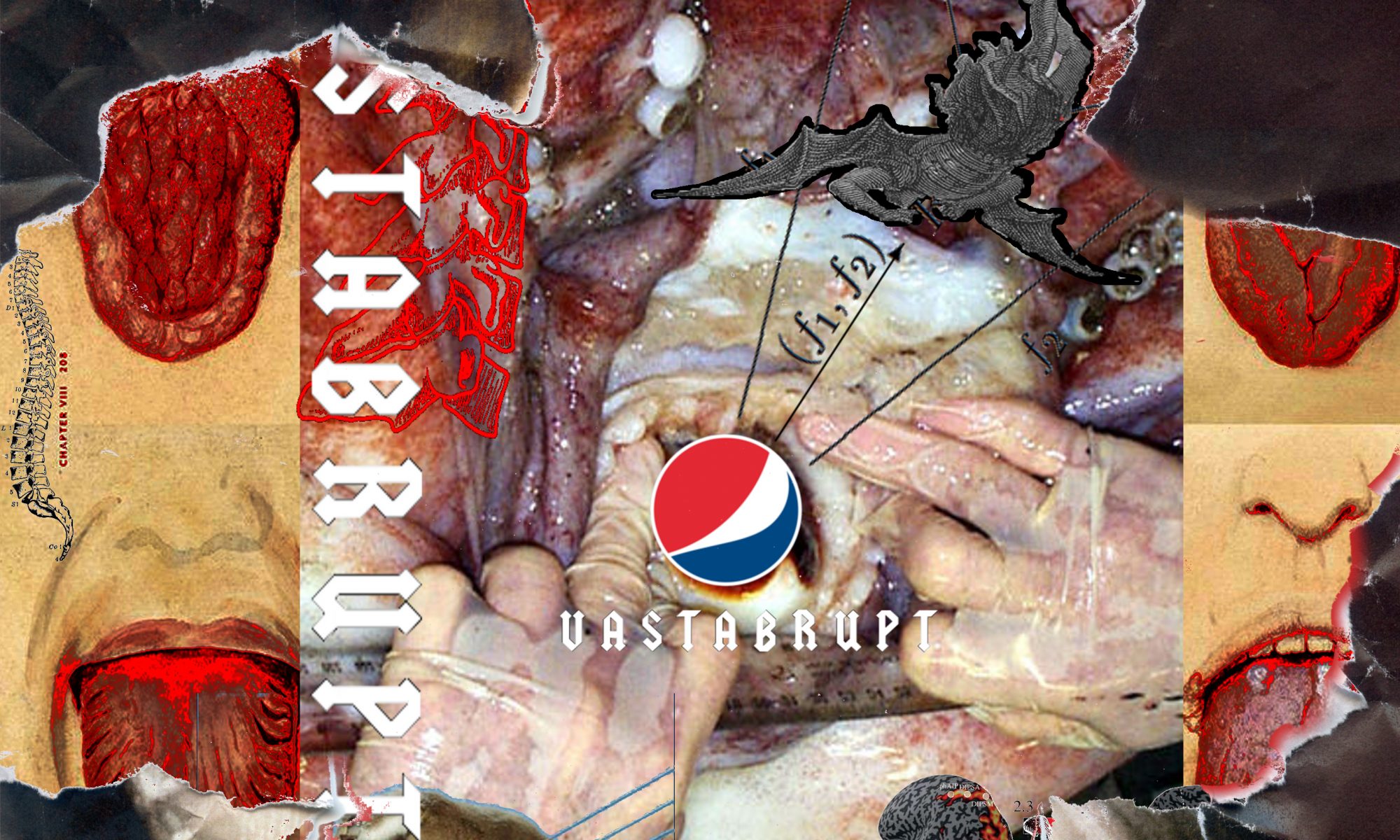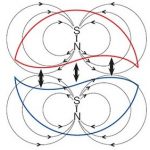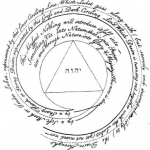Yesterday: ‘BASILISK: Menstrual Chaotics and God’s Ectopic Pregnancy’
DAY 6. Sugar & Zero, Milton & Böhme: the Dyspeptic Abyss of Theogony
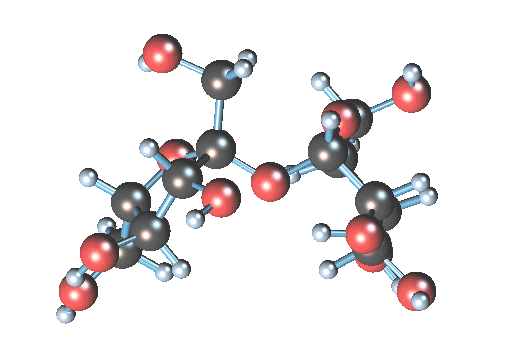
Insofar as Milton’s Chaos is inherently auto-productive it holds the ability to be ‘about’ something (i.e. a 19th century consumer product) that was only made real centuries later, precisely because this latter was ‘realised’ by the tendencies that Miltonic Chaos identifies. This ability for something entirely temporally distal to invade the signifying universe of a poetic chronotope is the perfect symbol for the temporal distortion attendant upon self-causing auto-production. Milton’s poem retrospectively becomes about Chaos — not God, or Adam, or even Satan — insofar as his Chaos has made itself real under the aspect of Pepsi-Capital’s liquefaction of reality.[note]CAPITAL TELEONOMY = 330 = COSMIC PEPSI ULCER[/note] It is thus, like the Fall, an event within time that bends the shape of time itself. Miltonic Chaos ‘became real’ in the world-consuming nigredo of Pepsi-Cola capital, reciprocally consuming us under the sign of a tartareous hydraulic desire-surge. We see this substantiated in the occult historical connections between carbonation and prima materia. Pepsi is base matter. Chaos is pure auto-production: identical to the demonic zero that creates itself out of nothing. Just as carbonation was originally tied to the self-producing zero of chaos, sugar, as the main ingredient of Pepsi Cola, also teems with occult connections to zero.
We have already noted that the late 18th century introduction of carbonation furthered the naval prowess required to support the thickening networks of the global sugar trade (and that this lead to an increase in trade that, in turn, was required to support growing public addiction, as sugar interfaced perfectly with human nervous systems, exploiting addictive tendencies as a conduit to birth a new form of consumer culture, creating one of the first examples of auto-producing hype). To this observation we must add the fact that the route of sugar into the West exactly parallels that of auto-productive zero in both geographical provenance and historical timeline. Both were developed in India’s Gupta Empire sometime around 400 BC. They then circulated throughout the Arab world and the Near East, eventually percolating into the West, and arriving in late medieval Europe around the 11th century. Zero was transmitted via the Moors of the Iberian Peninsula, and so too was sugar (as well as coming back to Europe with soldiers returning from the crusades). Just like zero, sugar arrives in the West at the beginning of modernity — this is not a coincidence. Both, alike, unleashed forces that tore apart, and continue to tear apart, the globe, installing an oecumenon, liquidating realities, and establishing abstraction ascendant.[note]The fully liquidated world radiates abstraction ascendant; the fully capitalised world radiates effervescence ascendant.[/note] Thus, as zero, carbonation, and sugar all flow together — and facilitate each other’s development — we see how all of history converges pepsoidally and chaomantically upon the point at which Chaos realises itself under the avatar of Pepsi.
PEPSI is TARTARUS is CAPUUT MORTUM is NIGREDO is SOL NIGER
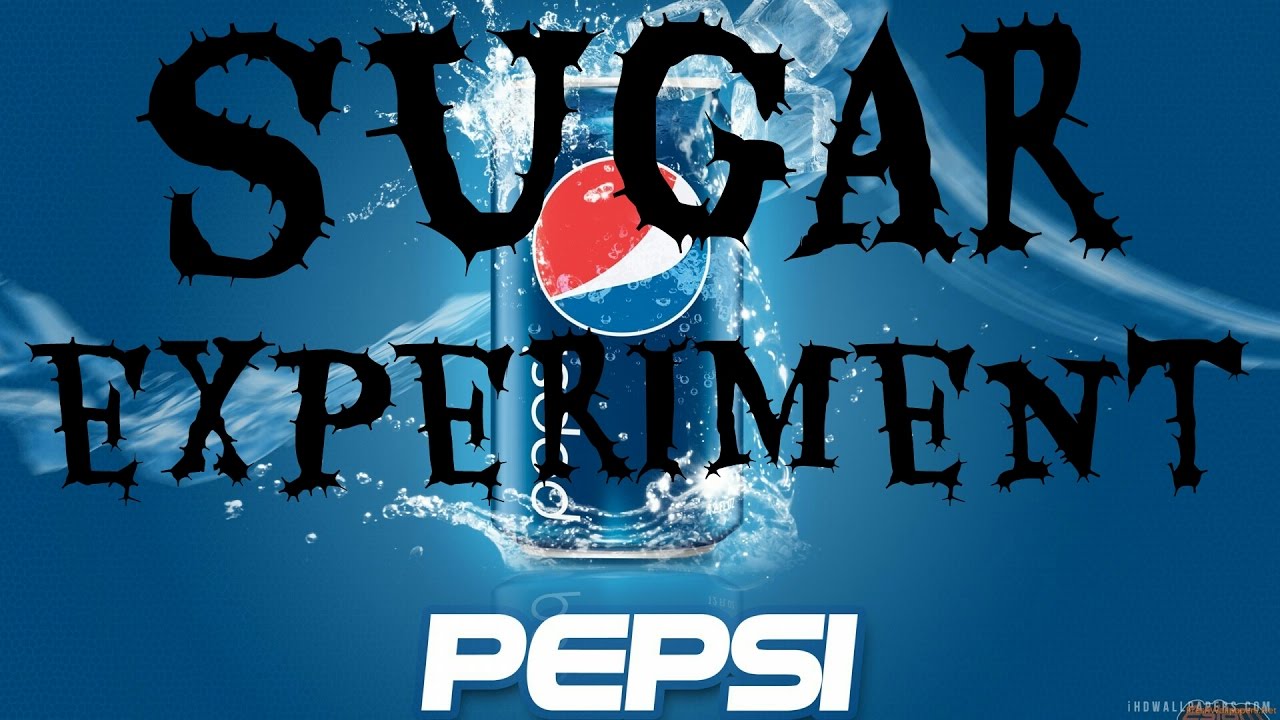
Existence effervesces in darkness eternal. Pepsi-Chaos — black, dark, yet tangible — is indwelling “darkness visible”. The ‘transcendental object = X’. It is both the liquid grounds of individuation, and the lubricant for the liquidation of all individuals.[note]Pagel: ‘Gas is central to [van Helmont’s] naturalist philosophy and cosmosophy’, as it is the ‘vector of object-specificity, the spiritual carrier of the specific life-plan of an object’. Joan Baptista van Helmont: Reformer of Science and Medicine, 63.[/note] Indeed, Milton stresses this by claiming that Chaos is “one first matter all”: prima materia or massa confusa. In this light, Pepsi-Chaos, as a “first matter” — becoming curiously coeval with and internal to God himself — is significantly problematic. Milton, despite the uncomfortable conclusions of this line of thought, was forced to present it in this way because of the entailments of certain metaphysical commitments he had already selected. That is, as previously mentioned, Milton (thoroughly committed to monism and, consequently, denying any possibility of creatio ex nihilo[note]Denial of ex nihilo is perhaps the base gene of monism: for, if all that ‘is’ is being, nothing can therefore arise from non-being.[/note]) chose to pursue the idea of an ex deo creation (and, in many ways, Paradise Lost plays out as the metaphysical test chamber for this thought experiment). Accordingly, prima materia becomes legible as arising from within God himself. This philosophical decision has some benefits. It averts the logical paradoxes surrounding ex nihilo creation that so disturbed the monist Milton. It also deftly avoids the need to posit the existence of some eternal matter unrelated or external to God, from which he merely fashioned the Creation like a carpenter (which would be perceived as eternalist heresy). The brave experiment of creatio ex deo avoids the Scylla and Charybdis of these two issues only by instead postulating that God created from out of himself (somewhat like a spider weaving silk). The idea of ex deo remained a heterodox philosophical option for exactly this reason: Thomas Erastus, a few decades before Milton, had written that creatio ex deo relegates God’s act of “creationem” to merely a “secretionem”. In other words, it makes resplendent and autonomous creation into a disgusting and bodily secretion: a scatological act of expulsion.[note]Indeed, Erastus was here writing against creatio ex deo in the context of denouncing Paracelsian iatrochemistry.[/note]
Unsurprisingly, interpreters have long diverged on the true position of Milton’s Chaos as an anterior increatum, coeval and internal to the godhead. Schwartz has argued that it is simply resoundingly evil; Rumrich — advocating for a Chaos in intimate somatic unity with God — reveals the possibility of a ‘hermaphrodite’ deity[note]A deity that reflects Paracelsus in their shared hermaphroditism.[/note]; Milton himself, in his De Doctrina, attempts to appear confident that his potentia materia is totally neutral. He describes it as “fonte” and “seminariam” of all things and therefore “not [at all] evil or worthless”.[note]Note here the spermatic resonances in “seminariam”, echoing Erastus’s language of bodily secretions; likewise, notice the fact that “fonte” itself originally referred to naturally carbonated springs.[/note] Milton was probably relying here on the fact that, in many ways, Chaos cannot strictly be said to be evil, because it is itself elder than the creation of Good and Evil. However, despite Milton’s intentions, this does not ‘neutralise’ it. Instead, it lends it an even more anonymous, anomalous and alien aspect. Satan is something we can know and delimit; Chaos is even more fearful because it cannot even be conceived. For, like the divine darkness of the potentia absoluta (which, in the manner of Milton’s antinomian contemporaries, surpasses the very idea of law itself), it cannot even be related to human mental categories (and thus to moral notions). Elder than Good and Evil — elder than Law itself — this is a totally sovereign and impersonal power (not therefore neutrality): indeed, Satan, Evil, and Sin are revealed as merely vectors of this chaotic elder force. One cannot even describe it as ‘evil’, because it is so utterly beyond moral categorisation: it is total and absolute otherness. As “infinite Abyss” and “eldest Night” it is antinomianism incarnate and potentiated. [PL; ii.405, 894.] Chaos comes, through this, to resemble the abyssal ground of God’s fearful omnipotence.[note]It is the ground of his preconscious and abyssal freedom, prior to all the limits of personeity, and against which he comes to limit himself in the act of identity. Of course, this is a route that Schelling would later explicate in his Freiheitschrift of 1809. As we shall see, Milton’s thought is similar to Schelling’s — despite geographic and historical distance — because both were heavily influenced by Jakob Böhme.[/note]
Milton’s confidence in De Doctrina broods over a thinly-veiled repression, because, whatever the ‘nature’ of his Chaos (and, indeed, its nature is to have no nature because nature is nomos and limit-through-identity), it must be one with God. The consequence of creation ex deo is that God must internalise the total alien externality of Chaos. For, in order to avoid positing the eternity of a separate matter and to simultaneously dodge the logical paradoxes of ex nihilo, creatio ex deo entails that Chaos become part of God himself. This crushingly anonymous potency is cast into intimate unity with God: and, with this, Milton inherits a central problem of the voluntarist tradition.[note]Indeed, from the very beginning, the voluntarist splitting of God into absolute power and ordinate power presages the splitting of the self into the unconscious and the intellectual.[/note] It allows for a resident alien: a resident alien that, because it precedes all boundaries, becomes capable of liquidating all boundaries. Bubbling Pepsi is thus revealed as God’s chaotic unconscious, prone to the production of basilisks. Moreover, given the physiological focus of the alchemical tradition that Milton inherited, this chaos-ingestion could not but be envisioned in peptic terms. God’s act of self-individuation — the theogenic shoring up of the limits and distinctions of his intellect and intentions in contradistinction to this unlimited and indistinct power — could only be imagined as a bowel movement. In order to emerge from his chaotic, liquid unconscious, God had first to shit it out. This is the act of “tartareous” Creation described above: God’s “downward purg[ing]” of the “black tartareous cold infernal dregs” prior to the creation of the heavens and firmament. Creation is, thus, merely the excremental by-product of God’s act of self-individuation.
Such ideas are strikingly cognate with the ecstasies of another of Paracelsus’s followers: namely, Jakob Böhme (1575-1624), German mystic and theologian. In Böhme’s strikingly singular description of theogeny and cosmogeny, God comes to know himself as God only by delimiting himself against an internal “Abyss” of “Eternall Nothing”: his Chaotic “ungrund”, as Böhme dubs it.[note]UNGROUND = 186 = COLA XANADU [/note] Prior to this, both God and Chaos were in a state of total and absolute indistinction. For, as Böhme makes clear, if “everything were only one, that one could not be revealed to itself”.[note] Boehme, The Works of Jacob Behmen, the Teutonic Theosopher: To Which is Prefixed the Life of the Author; with Figures Illustrating his Principles, left by the Rev. William Law, M.A, trans. W. Law, iv.Vols, (London, 1764), iii.76. In this way, he prefigures much of German Idealism. Moreover, it is from this tradition that Jung borrows his conception of alchemical prima materia to represent the indifferentiation (indiffrenz) preceding subjectification.[/note] Thus the God accedes to a state of self-knowing only through his limitation against this internal chaotic otherness. It is only through this inner splitting that the chaotic and primordial ungrund filters itself into the dichotomies of Subject/Object and God/Matter that are the sufficient conditions for the possibility of His self-consciousness. Yet, as God emerges to himself — as he comes to know himself — he necessarily only does so by purging the caput mortuum of externality from himself. Thus, the first act of subject-formation arises through an act of hygiene. He does this by setting up the barriers that enforce individuation — by gastrulating himself — and thereby evacuating the chaotic ungrund.[note]INDIVIDUATION = 268 = DISSOLVED SELF = PEPSI COLA CHAOS [/note]
Of course, attuned to the Paracelsian tradition, Böhme could not help but present this in an anal mode. He talks of the excremental “Lump” engendered “[when], between the Firmament and the Earth, [the cosmos] was cleansed from Dregs”.[note]Ibid, iv.108.[/note] For, just as “in the Body” a “Superfluity” or “Excrement” is driven out (via, as Böhme explains, a peristaltic “Inclosure round about it, viz. a Film, or Gut”) and becomes “banish[ed]” through the “nethermost Port”, so too “happened also to the Earth, when the Fiat thrust it out of the Matrix […] upon a Heap as a Lump, seeing it was unfit for Heaven”.[note]Ibid.[/note] Digestion — as an “Inclosure” that blocks out external excess — sets up the Subject only by excrementally purging the inner Chaos: this physiological boundary is directly paralleled by the normative boundary between ‘wrong’ and ‘right’ that generates rationality and conceptual intelligence through discursive “Inclosure”. It should come as no surprise, then, that Böhme theorised that in a pre-lapsarian state (prior to the introduction of Knowledge of Good and Bad into the world), Adam would have required “no teeth or any intestines” (because “no filth accumulated in him”).[note]Böhme, Genius of the Transcendent: Mystical Writings of Jakob Boehme, (Shambhala Publications, 2010), 7.[/note] Epistemic fallibility arises coeval with digestive fallibility (and, as Böhme first discovered, both are necessary conditions of individuality).[note]Milton nods to this tradition of speculation (that Adam did not have a gut or an anus) when he claims that God “did enlarge the universal diet of man’s body” when he made us free (to be right or wrong, in matters both epistemic and eupeptic).[/note] Only with such distinctions does subjectivity emerge from initiation: whether they be conceptual barriers (right from wrong) or the barrier of the “Inclosure” installed by a “Gut” (distinguishing nourishment from superfluity). Once again, we see the reinforcement of Chesterton’s decree that “aerated waters” could only be postlapsarian. Digestion is the cosmic trauma of a fallen world, but also the very condition of individuality within this world. The possibility of erring, in both culinary and moral matters, arises only after the original trauma that arrives from the originary purge of externality generative of the first internality — that is, God himself, when he ejaculated his prima materia.
We can now observe how Böhme’s theories of dyspeptic theogeny perfectly frame Milton’s own excremental Creation in Paradise Lost. Within Milton’s unavowedly monist universe, for God to emerge as a subject he must gastrically individuate himself from dyspeptic chaos. He does this by literally purging the superfluity, in the first act of digestion. Unsurprisingly, just as Milton was familiar with Paracelsus and van Helmont, he was also certainly well aware of Böhme.[note]Nathan Paget, Milton’s close friend and a man of radical speculative inclination [G. Campbell, & T.N. Corns, John Milton: Life, Work and Thought, (OUP, 2008), 321.], appears to have had a “very special interest in Boehme”. [C. Hill, Milton and the English Revolution, (Viking Press, 1978), 493-5]. His library, more specifically, contains an unusually large amount of the German philosopher’s works (some in manuscript form, others printed in the original German, prior to the English translation’s appearance). Hill speculates that it is “most likely” that Paget “would have discussed [Boehme] with [Milton]”. (Moreover, Paget owned 19 works by Paracelsus, 4 by van Helmont, and a couple by Charleton.) Further, Edward Phillips — Milton’s nephew — became embroiled deeply in the mystic’s writings: Phillips worked for the Fifth Earl of Pembroke to “interpret some of the Teutonic philosophy” of Jakob Boehme [Ibid, 493-5]. And, finally, Böhme’s name turns up in Milton’s own state papers. In an address from “Mr. Samuel Herring” to parliament from 1654, “Jacob Behmen” is described by Milton as a “noble minde […] soaring beyond the letter” with “true revelation from the true spirit”. The address even closes by proposing for the opening of academies teaching Boehme’s philosophy in England. [cf. John Milton, Original Letters and Papers of State: Address to Oliver Cromwell, Found among the Political Collections of Mr. John Milton, ed. J. Nickolls, (London, 1743), 99.][/note] The traces of Böhme’s dyspeptic divine ungrund can be found throughout Milton’s writing. Exemplary is Milton’s speculation, in De Doctrina Christiana, upon the relationship between his postulated “increatum” (i.e. “first matter”) and God. For, at this particular juncture in the theological treatise, the poet’s Latin tellingly becomes “awkward” and “barely makes sense” (‘signalling greater troubles […] with meaning’: perhaps flagging, therefore, an indigestion of signification).[note]De Doctrina, 90-1.[/note] One thing sticks out amongst the knotted syntax: an unusually high frequency of verbiage related to ‘emissions’. The language surrounding God’s “Impensionem” (‘giving out’) of base matter betrays Milton’s preoccupation with ‘emanations’. For example, Milton deploys the words “comprimere”, “eimittere”, and “propagare” in proximity (‘comprimo’ sometimes denoting constriction of the bowels; ‘emitto’, likewise, signifying discharge of bodily liquids; ‘propagare’ carrying denotation of disseminations).[note]De Doctrina, 290.[/note] Perhaps the most striking illustration of Milton’s dyspeptic model of cosmogeny and theogeny can be found in De Doctrina’s final words on the relationship between prima materia and deity in the act of Creation. Here, Milton concludes that “materia indigesta modo et incomposita, quam Deus postea digessit et ornavit”. (Which can be translated roughly as: ‘The first matter was in an indigested and disordered state, but afterwards God digested it and made it beautiful.’) Here, Milton — in a manner identical to Böhme — explicitly declares that the relationship between Chaos, God, and Creation is one of digestion: as the “indigest” is said to be “digessit” by the divine.[note]De Doctrina, 290-2.[/note]
All of this can be reduced to a very elaborate response to the voluntarist dichotomy (the chasm between a god who is good and a god who is totally free). One that, modulated through the alchemical tradition, simultaneously generates a notion of a divine unconscious and casts this unconscious as a dyspeptic divine gut. “The soul is a (disobedient) stomach!” For, insofar as intelligence is made out of rules, preconscious and unlimited freedom is better expressed by excrement (that which exceeds regimentation). It all goes to show that even God could never fully assimilate or anabolise the potency he is grounded — and fed — upon. This is largely because it is God: an elder, impersonal, pre-individual, and unrestrained aspect of ‘himself’. It is no coincidence that Schelling, and later Jung, borrowed the language of alchemical prima materia to describe the journey from unconsciousness to subjectivity.[note]The Jungian process of enantiodromia: the procession of alchemical colours, from black nigredo (Pepsi) to white albedo, to yellow citrinitas, to red rubedo.[/note] The upshot of all of this is as follows: Creation is the by-product of the worst dyspepsia imaginable — an indigestion so cosmic that it forced God himself to become self-conscious. It is a traumatic self-awakening that impels God to limit himself against the unlimited and anonymous power of chaos: a delimitation that therefore requires an excremental purging of this chaotic base matter. After this individuating evacuation, God works to impose his intelligible forms upon the excess produced by this purge (Böhme’s faecal ‘lump’), attempting to filtrate and subtilise it (like a master alchemist) into crystalline firmaments and planets… but the “superfluity” lurks, repressed, deep within.
FANTA™ = RUBEDO (as cinnabar)
MOUNTAIN DEW™ = CITRINITAS
CALPIS™ = ALBEDO
PEPSI™ = NIGREDO (as pepsoidal ungrund™)
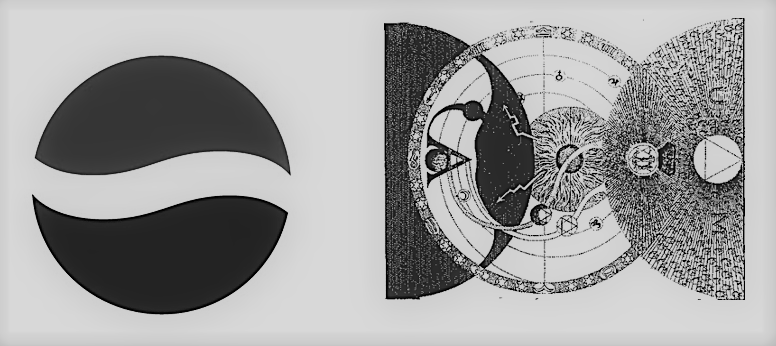
Tomorrow: ‘𝕯𝖊𝖘𝖈𝖊𝖓𝖘𝖚𝖘 𝖆𝖉 𝕴𝖓𝖋𝖊𝖗𝖔𝖘: or, My 🅱elly Consumed My Head’
